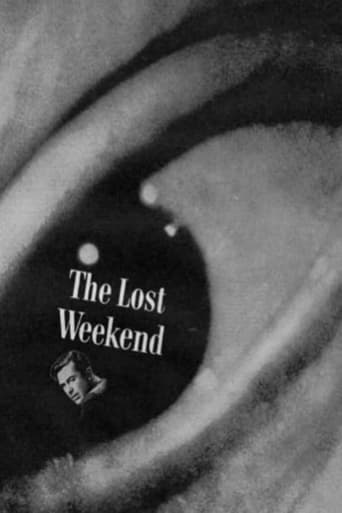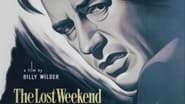Pjtaylor-96-138044
'The Lost Weekend (1941)' wraps itself up a little too quickly to be entirely convincing, though the promises made in the finale could be just as empty as those made in the opening (making the ending much darker than it appears to be), and there is the occasional lull in pace marked by a repetition indicative of the alcoholism of the protagonist, but it's a daring and generally powerful cry against addiction in all its forms compounded by some excellent writing and performances (especially the Oscar-winning turn from Ray Milland) that really get into the psychology of the characters. 7/10
jovana-13676
This film is Italian neorealism shot in Hollywood, why and how is something to think about. Gruesome, nightmarish, it must have been the Trainspotting of the Hollywood Golden Age. Ten minutes into the film, I just knew - this guy must have won an Oscar for his drunk performance! I had to pause and check; I was rooting for him. Sure enough, he took home a well-deserved Oscar.
jadavix
In "The Lost Weekend", Ray Milland gave what may have been the screen's first ever serious portrayal of an alcoholic. The dipsomaniac was a stock character of comedy theatre long before films were invented, but Milland's Don Birnam bears no relation to the characters famously played by W.C. Fields.Birnam is a struggling New York writer who gets by with the support of his brother, Wick, and his saintly girlfriend, Helen. These two intend to take Birnam on a weekend vacation that will extend a period of sobriety, however Birnam heads to a bar where he gets drunk and loses track of time, missing the trip. He thereafter heads on a massive bender.There are a series of harrowing scenes that follow, such as the heart-wrenching moment where Birnam is caught trying to steal to pay his bill in a restaurant, and his experience of Delirium Tremens. There is also a sadistic nurse in the real-life Bellvue Hospital where Birnam briefly stays; this was the first movie that the Hospital allowed to be filmed there.The movie has, it must be said, a commendable realism, as does Milland's powerful central performance. The movie even hints at the even more bleak possibility of suicide; however, the ending seems to take a step back from truth, with a happy ending I could have done without.
grantss
Don Birnam is an alcoholic. His brother Wick and girlfriend Helen know but believe that he is on the wagon, a belief he does his best not to shatter. They try to keep him sober and healthy by arranging trips and other such events. One is this weekend - Don and Wick are heading to the country. However, Don manages to delay the trip and then evade it altogether, in order to get drunk in a bar. He has no money, so often ends up getting his alcohol by more and more outlandish and nefarious means. He does have two things going for him: Helen loves him and will do anything to see him shake his addiction. The other is that he has a great talent for writing, and has great ambition in that regard. However, his productivity as a writer is undermined by his alcoholism, creating a downward spiral of despair and addiction. Sensing his own plight, his thoughts turn darker...From master movie-maker Billy Wilder, a film that realistically and hauntingly shows the effects of alcoholism, and the plight its victims find themselves in. Very claustrophobic, in that you can sense how Don Birnam is trapped, and how he knows he's trapped. All his best intentions, and those of his loved ones, come to nothing, creating an intense, despairing situation.Excellent plot, very well directed by Wilder. He builds the intensity and despair well, starting with a rather light scene and then slowly turning up the darkness and anxiety. The conclusion is a bit too neat and swift though. Considering what came before, it really needed a bit more open-endedness.Great work by Ray Milland in the lead role, a performance for which he received a Best Actor Oscar. Good support from Jane Wyman as Helen. Billy Wilder got his first, and second, Oscar with this movie - Best Director and Best Screenplay. The movie itself won Best Picture at the 1946 Oscars.While it may seem less topical a subject nowadays, with drug addiction replacing alcoholism as the source for addiction movies, this is no less confronting, or harrowing.










